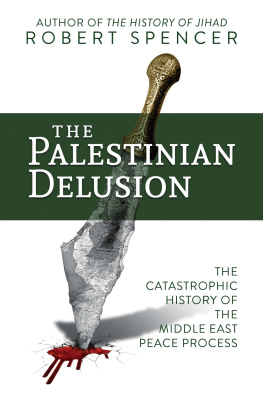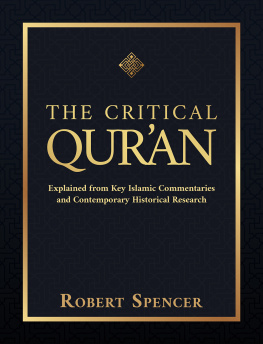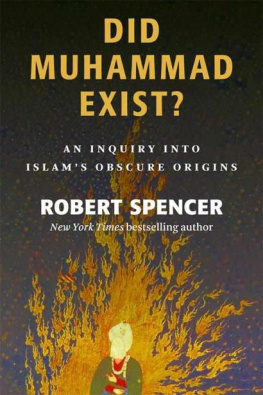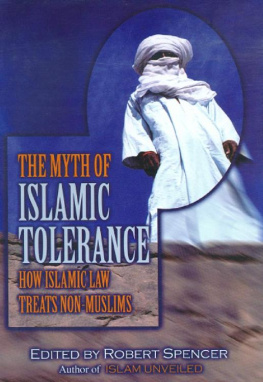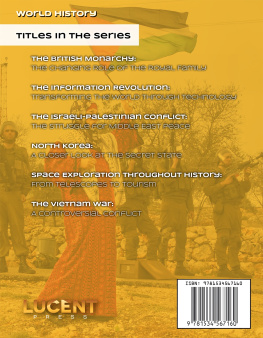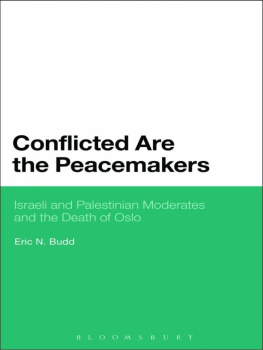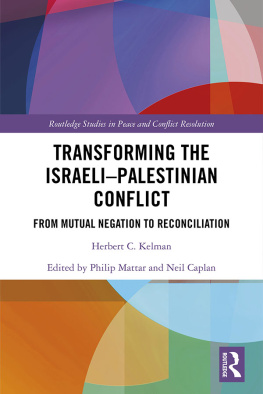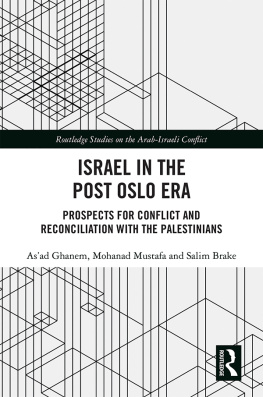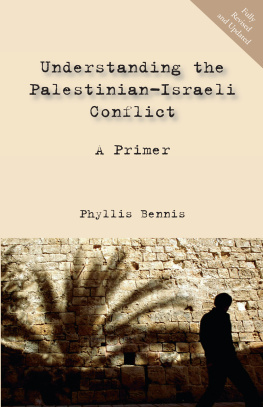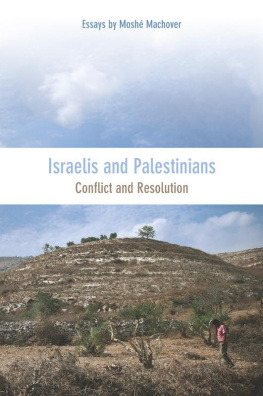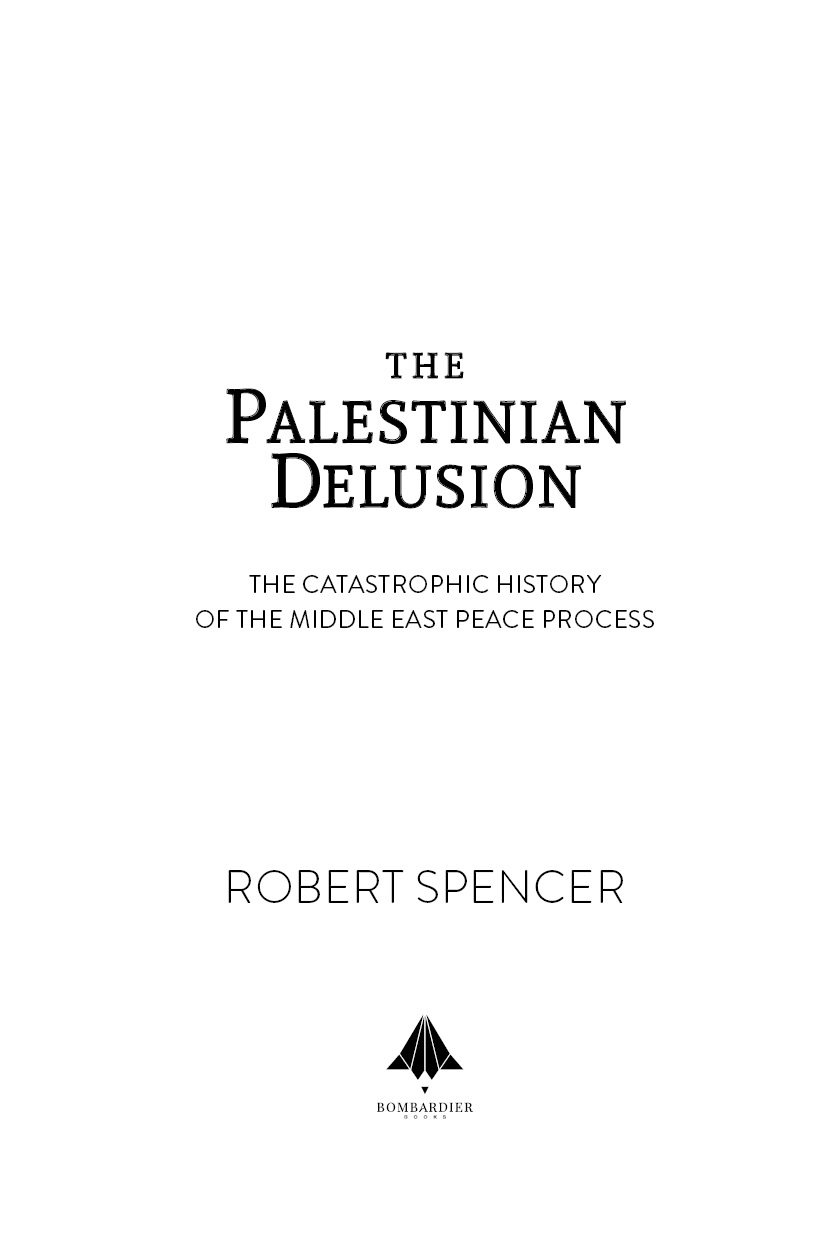Advance Praise for
T he P alestinian D elusion
Its a great read, well researched, and very important for any student of the Israeli-Palestinian conflict to consider the information being presented. Even for people who are well read on the subject, there are many new details to learn and absorb.
Dov Hikind , former Democratic New York State Assemblyman
(19832018) representing Brooklyns Assembly district 48
If you want to learn the whole unknown hidden truth of the Arab/Islamic war against Israel, read this book from cover to cover. Robert Spencers book teaches you how to answer virtually every propaganda lie about Israel and Arabs one is confronted with by Israel-haters, Jew-haters, and those simply ignorant of the facts. This comprehensive treatise will eliminate the ability of newspapers and TV and radio and social media to convince you of their Mideast distortions and falsehoods. A critically necessary work in this Orwellian era.
Morton Klein , National President,
Zionist Organization of America (ZOA)
This is eye-opening history with enormous implications for foreign policy today. Taking us through the sad history of the Middle East peace process, Robert Spencer is the one analyst of the situation with the courage to identify why these peace negotiations have all failed, and will always fail. This book should be the occasion for a major reset of our policies toward Israel and the Palestinians, and a handy guide for everyone who is tired of the media spin on this all-important issue.
Steven Emerson , Investigative Project on Terrorism
Spencer brings his formidable erudition and smooth keyboard to the knotty topic of the Palestinian assault on Israel. Deftly separating fact from fiction, he persuasively establishes the justice of Zionism and the barbarism of its opponents. Everyone should read this one-volume synthesis to understand the most complex conflict of our time.
Daniel Pipes , Middle East Forum
Also by Robert Spencer
Confessions of an Islamophobe
The History of Jihad
A BOMBARDIER BOOKS BOOK
An Imprint of Post Hill Press
The Palestinian Delusion:
The Catastrophic History of the Middle East Peace Process
2019 by Robert Spencer
All Rights Reserved
ISBN: 978-1-64293-254-6
ISBN (eBook): 978-1-64293-255-3
Cover design by Cody Corcoran
No part of this book may be reproduced, stored in a retrieval system, or transmitted by any means without the written permission of the author and publisher.

Post Hill Press
New York Nashville
posthillpress.com
Published in the United States of America
This book is dedicated to all those
who have given their lives to reestablish
and defend a homeland for the Jewish people.
Contents
Indigenous People?
From the river to the sea, Palestine will be free.
This chant, long a favorite of Palestinian terror groups, has become increasingly mainstream in recent years, to the extent that in November 2018, CNN commentator and Temple University professor Marc Lamont Hill repeated the phrase while speaking at a United Nations event. CNN fired Hill, but Temple didnt, which is itself an indication of how widely accepted the phrase has become.
Freeing Palestine from the riverthe Jordanto the seathe Mediterraneanwould mean the complete eradication of Israel, and likely a new genocide of the Jews, which is why the phrase is so controversial, but it also communicates a great deal more. The declaration that Palestine will be free assumes that it is being trodden underfoot by invaders and occupiers, and that the Palestinians are the indigenous people of the area.
This idea, too, is gaining increasing acceptance today. In early October 2018, Brown Universitys Office of Diversity and Multicultural Affairs sent out an announcement about Indigenous Peoples Day Weekend, the universitys politically correct replacement for Columbus Day weekend. The indigenous people being celebrated, the announcement stated, included 567 Federally Recognized tribes, 61 State Recognized tribes, as well as Hawaiians and the people indigenous to its territories in the Caribbean and Pacific Oceans, all of whom have allegedly suffered genocide and forced assimilation.
The backdrop of Browns statement is an understanding of the situation of Israel and the Palestinians that is widely accepted today, and has been succinctly enunciated in the Harvard International Review by Hatem Bazian, a professor at the University of California, Berkeley of some of the keenest preoccupations of modern academia: Muslim American Studies; Colonialism and Post-Colonial Studies; Arab and Arab American Studies; Critical Race Theory; Palestine Studies; and Comparative Liberation Theologies: Over a 50 year period, the indigenous Palestinians faced an emergent European nationalist movement that succeeded in dispossessing them and transforming their ancestral homeland into a modern nation state that locates its genesis in the biblical text.
The Office of the United Nations High Commissioner for Refugees (UNHCR), popularly known as the UN Refugee Agency, agrees, stating: Jewish nationalist ideology, Zionism, led to claims on Palestine for the Jewish people. Zionism began in Europe, in reaction to pogroms in the east and assimilation in the west. Early in the 20th century, Zionist leaders began planning for Jewish settlement in Palestine, and the removal of the indigenous population.
Zionists believe that Jews should return to Zion, that is, the land of Israel, as their rightful home. Palestinian Authority president Mahmoud Abbas has directly contradicted the central Zionist claim, that the land of Israel is the ancestral home of the Jews, and has advanced a counterclaim: Our narrative says that we were in this land since before Abraham. I am not saying it. The Bible says it. The Bible says, in these words, that the Palestinians existed before Abraham. So why dont you recognize my right?
Dimitri Diliani of the Fatah Revolutionary Council likewise declared that the Palestinian people [are] descended from the Canaanite tribe of the Jebusites that inhabited the ancient site of Jerusalem as early as 3200 BCE.
But is that really true? Are the Palestinians really the indigenous people of the area that the State of Israel now occupies, and were they really displaced by the Israelis?
There is no trace of support for such an idea in history. No archeological evidence, or evidence of any other kind, has ever been found to substantiate a link between the ancient Canaanites or Jebusites and the modern-day Palestinians. The land that is now the State of Israel corresponds roughly to the lands known in ancient times as Judea, Samaria, Idumea, and Galilee, and was inhabited by Jews. In A.D. 134, the Romans expelled the Jews from the area in retaliation for a revolt against their rule led by the self-appointed messiah Simon Bar Kokhba; as an insult to the Jews and to efface any traces of their connection to the land, they renamed Jerusalem Aelia Capitolina and the region Palestine, a name they plucked from the Bible, as it was the name of the Israelites ancient enemies, the Philistines.
Subsequently, Palestine was the name of a region but never of a people or of a political entity. The area that was Palestine was part of the Eastern Roman (Byzantine) Empire until it was conquered by the Arabs. Later it came under the control of the Turks, who ruled it until the Ottoman Empire collapsed at the end of World War I.

